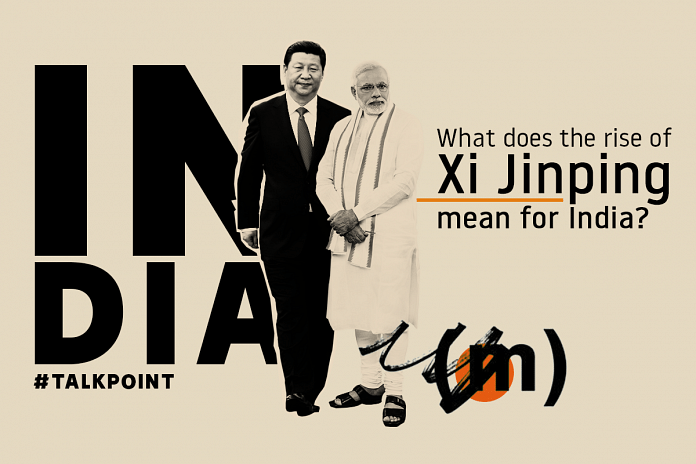China announced a break from tradition and has moved to abolish term limits on presidency. Xi Jinping completes his first-term as President in 2018. Now, with the term extended indefinitely, his consolidation of power will be complete.
ThePrint asks: What does the rise of Xi Jinping mean for India?
While he is no Putin, Xi has already demonstrated a greater appetite for risk.
 Andrew Small
Andrew Small
Senior transatlantic fellow at the German Marshall Fund of the United States
Although China-watchers expected Xi Jinping to extend his hold on power beyond the next Party Congress, the proposal to abolish term limits on the presidency still came as a shock. The move represents an unusually open intent to dismantle the political structures that Deng Xiaoping had put in place to prevent a repeat of the horrors of Maoism. It addressed one of the greatest weaknesses of autocratic systems – their inability to manage stable successions.
Xi’s apparent consolidation of an unrestricted tenure is emblematic of both his power and its fragility. The claims that he is China’s most dominant leader since Mao look ever-more accurate. Yet in the process of putting himself in this position, he has made a significant array of enemies and has nothing approaching Mao’s personal authority. Xi is clearly aware that he is only safe as long as he wields the machinery of the party and the state, and even then, only as long as he makes no major errors.
After the defenestration of Sun Zhengcai and a Party Congress that anointed no potential successors, India was already aware that it should be preparing to deal with Xi for a long time to come. That remains the most likely outcome.
But it does not imply more predictability. The return to a system based on strong, personality-based leadership means less adherence to tradition in Chinese foreign policy and greater willingness to overturn convention. While he is no Putin, Xi has already demonstrated a greater appetite for risk. And the odds have also shortened on more dramatic disruptions. It appeared that Deng had successfully institutionalized the principle that the Chinese Communist Party is bigger than one man. Not anymore. If Xi slips up, India should be ready to deal with political turmoil next door.
Whether it is Xi Jinping or anyone else, Beijing’s approach to India will remain similar
 Alka Acharya
Alka Acharya
Professor, School of International Studies, JNU
To begin with, this issue has been the cause of much speculation and discussion since the 19th party conference last October, when no successor was announced. Xi Jinping’s continuation in power beyond two terms was widely anticipated. Now this amendment will overturn the earlier political reform that had been introduced by Deng Xiaoping reforms, which had limited the top leader to two consecutive terms.
In the Chinese media, Xi is projected not as an ordinary leader – lingdao – but has established himself as as lingxiu, a spiritual;/philosophical guide. He is a champion fighter against corruption; has now authored two huge tomes on governance and has poised himself to lead China to acquiring its rightful status as a global power.
This clearly changes the game considerably but it would appear that this decision is based on a sort of consensus at least among the top leadership — and that Xi has managed to override such objections as may have been raised, points to a qualitative strengthening of his power. With this amendment, Xi would consolidate this consensus into total backing — now that Xi Jinping thought is already enshrined in the Constitution.
It is the Chinese citizens who should be more concerned about his power consolidation. Most people in China would agree that China would be now decisively stepping into a global leadership role and strong leader is necessary. However, it would have major implications for further political reforms, as also the question of freedom and dissent within China.
As to the impact of this on India, the question we need to ask is : are we worried about a, b, or c as far as China is concerned or are we worried about China? There are no major or dramatic differences in the party when it comes to dealing with India, whether it is Xi or anyone else, the approach will remain similar.
China has always had leaders who have been positively disposed towards India. The last few years has seen a plateauing of the momentum, but that now seems to be undergoing a rethink. We need to reestablish our linkages with the highest echelons of the Communist Party and political leadership — we have sufficiently strong connections. The critical question is how do we engage in the future.
With Xi’s rise, Beijing will work harder to lure India’s neighbours out of its orbit
 Praveen Swami
Praveen Swami
Security affairs analyst
Two thousand years ago, Qin Shi Huang, the Emperor who made modern China, set out to “unify all under heaven”. Freed from legal shackles, which limited his reign to two five-year terms, President Xi Jinping is free to realise a foreign policy that seeks the same end. For India, this is not good news.
In October, at the Chinese Communist Party congress, Xi promised “a new type of international relations” to remake the world into “a global community of common destiny”. This ambition, as the scholar Xie Tao has pointed out, exceeds that of any Empire in history.
From the inside, Xi’s project makes sense: where China’s neighbours see a fire-breathing dragon, the dragon imagines itself to be surrounded by phalanxes of hunters, paid for and armed by a malign United States.
But Xi’s China-led world order has, inexorably, led to conflict with neighbours, including India.
India can now expect intensified pressure on its borders. Beijing will also work harder to lure India’s neighbours out if its orbit, by showering them with gold. Each of Beijing’s growls is meant to warn India of the perils of allying with the United States.
Bigger risks exist, too. The United States has guaranteed global access to West Asia’s hydrocarbons. But the United States is no longer dependent on West Asian oil, and China has become India’s main competitor for these resources.
Will the United States still be willing to commit treasure and blood to uphold the rules it made? And if it won’t, what course ought India take?
For the world and India, a more aggressive China is now a given
 Harsh V. Pant
Harsh V. Pant
Professor of International Relations, King’s College London and head, Strategic Studies Programme, Observer Research Foundation
For a world worried about Donald Trump’s Presidency, Chinese Communist Party’s (CCP) decision to drop term limits on the nation’s presidency is all set to have an even more profound impact on the global order.
This is not really a surprise as there have been speculations for some time now that President Xi Jinping would seek to extend his presidency beyond 2023. Last year’s party congress had made a move in this direction. Xi’s ideology got enshrined in the party’s constitution, and in a break with convention, no obvious successor was named.
It was in the 1990s that the tradition of limiting presidencies to 10 years emerged as Deng Xiaoping sought to modernise the Chinese polity by avoiding the excesses of the Mao era. Xi’s rise has challenged most of the assumptions about China. He wants to make China the pre-eminent global power and he is convinced of his own destined role in making that a reality. He has already removed most of his political opponents in his aggressive anti-corruption drive and has sought a fuller control of the military.
For the world and India, a more aggressive China is now a given. Beijing under Xi will now move with greater confidence towards asserting its interests and New Delhi will have to figure out a response so that its core interests are protected. India will have to draw clear red-lines for China but Beijing under Xi would be more than willing to push the envelope. India’s already frosty ties with China are likely to face strong headwinds under a stronger, more in control Xi.
In the meantime, however, all hail the new Chinese Emperor!
China’s economic and military influence will rise, India needs to win back the neighbourhood
 Lt. Gen. (Retd) S.L. Narasimhan
Lt. Gen. (Retd) S.L. Narasimhan
Member, National Security Advisory Board, and Distinguished Fellow, Centre for Air Power Studies
Ever since Xi Jinping came to power, it has been speculated that he may look for a third term. The removal of the provision limiting the tenures of the President and Vice-President to two is being sought now.
This may be done during the National People’s Congress that will be held in March this year. This will entail a return to the Mao-era that the Chinese did not want to return to. In the past five years, there has also been a trend to go back to the old practices like the self-criticism meetings. It is likely that the trend toward older practices will continue if Xi comes to power in 2022 again.
We need to be conscious of this. The role of Wang Qishan, who is tipped to become Vice-President, will also be crucial. We need to be prepared to see increased influence of China in our neighbourhood to include the extended one, both economically and militarily. While we need to take note of it and not unduly worry about it, we need to get our act together in building our capabilities and capacities in the military, political and diplomatic domains.
We also need to win over our neighbourhood back by timely implementation of the promises that we make to them. Moreover, we need to reassure them of our commitment to Security and Growth for all in the Region (SAGAR) that we have articulated.
Xi’s rise is not bad news for India, it can be an opportunity to remodel ties.
 Pranab Dhal Samanta
Pranab Dhal Samanta
Editor, ThePrint
Chinese President Xi Jinping has freed himself from the clause that would have, otherwise, limited his presidency to just two terms. Yes, this makes him supremely powerful, but it’s important to understand in which way and how?
First off, this by no means, is bad news for India. If anything, there’s probably an opportunity.
The better part of Xi’s first-term was spent consolidating himself, dealing with different factions of the Communist Party of China – prominent among them were Jiang Zemin group and the Hu Jintao group.
Xi carried out a massive purge to ‘weed out’ corruption within the party and the powerful Central Military Commission (CMC). The CMC has, in fact, been reorganized. Four large size departments have been dismantled and regrouped into 15 CMC agencies.
The clean-up exercise was anchored in a strong ‘New China’ nationalism narrative, meant to power China as a world leader. This resulted in a more aggressive defence and foreign policy, which had its fallout on almost all of China’s neighbours including India.
It is said that as a consequence, many of the high-ranking military brass who wanted to escape the purge adopted excessively aggressive nationalist tactics in their domain or area. On India, for instance, one assumption is that internal chaos may have prompted offensive tactics on the boundary, daring Xi to pull back.
Conspiracies aside, the truth is that Xi is now firmly ensconced. If the purge weakened his challengers, this consolidation should make him feel more secure.
A politically secure, more powerful Xi doesn’t need to be aggressive any more. Here lies the opportunity to remodel relationships and reorder priorities. And India must move fast to smoothen the rough edges at the start of Xi’s new innings.
On balance, a stable power matrix in China may prove to be a lesser, more negotiable threat for countries like India. The question is will Xi transform it into a bigger opportunity.
Compiled by Deeksha Bhardwaj, Journalist at ThePrint.




What has happened is over .India need not worry. We have to upgrade our defence. Not talk but watch out with synical aprehention. You can expect oppressive measures by Xi that can become his nemises. World has changed since Mao. Japan is different. Pyongyang can be a headache. For Xi. Tibet is to be watched. All said and done What he wants to do by making China a global power .Make Manderine the world language. A new world order he wants to create? Expansionism has its problem.
Correct — the situation is basically that China has a “Mao in a suit” and we got burnt by ORIGINAL Mao, so we should view him exactly as that post-1962!
Out with the old, in with the old — Red China is an enemy, on which India must always keep watch irrespective of who is dictator; btw, it is overdue for India to start relations with Taiwan, and term it “LEGITIMATE China” (even though Taiwanese aren’t necessarily India’s friends) with Red China as “ILLEGITIMATE”!
We must do our sums carefully. China has suggested that a ” prudent ” approach should be taken while resolving differences. That is the key word for India.